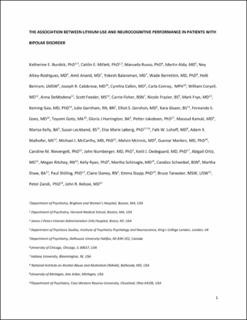The association between lithium use and neurocognitive performance in patients with bipolar disorder
Burdick, Katherine E.; Millett, Caitlin E.; Russo, Manuela; Alda, Martin; Alliey-Rodriguez, Ney; Anand, Amit; Balaraman, Yokesh; Berrettini, Wade H.; Bertram, Holli; Calabrese, Joseph R.; Calkin, Cynthia V.; Conroy, Carla; Coryell, William; DeModena, Anna; Feeder, Scott; Fisher, Carrie; Frazier, Nicole; Frye, Mark; Gao, Keming; Garnham, Julie; Gershon, Elliot S.; Glazer, Kara; Goes, Fernando S.; Goto, Toyomi; Harrington, Gloria J.; Jakobsen, Petter; Kamali, Masoud; Kelly, Marisa; Leckband, Susan G.; Løberg, Else-Marie; Lohoff, Falk W.; Maihofer, Adam X.; McCarthy, Michael J.; McInnis, Melvin; Morken, Gunnar; Nievergelt, Caroline M.; Nurnberger, John I.; Oedegaard, Ketil J.; Ortiz, Abigail; Ritchey, Megan; Ryan, Kelly; Schinagle, Martha; Schwebel, Candice; Shaw, Martha; Shilling, Paul D.; Slaney, Claire; Stapp, Emma; Tarwater, Bruce; Zandi, Peter P.; Kelsoe, John R.
Journal article, Peer reviewed
Accepted version
Permanent lenke
https://hdl.handle.net/11250/2760690Utgivelsesdato
2020Metadata
Vis full innførselSamlinger
- Department of Clinical Medicine [2066]
- Registrations from Cristin [9791]
Sammendrag
Lithium remains the gold standard for the treatment of bipolar disorder (BD); however, its use has declined over the years mainly due to the side effects and the subjective experience of cognitive numbness reported by patients. In the present study, we aim to methodically test the effects of lithium on neurocognitive functioning in the largest single cohort (n = 262) of BD patients reported to date by harnessing the power of a multi-site, ongoing clinical trial of lithium monotherapy. At the cross-sectional level, multivariate analysis of covariance (MANCOVA) was conducted to examine potential group differences across neurocognitive tests [California Verbal Learning Test (CVLT trials 1–5,CVLT delayed recall), Wechsler Digit Symbol, Trail-making Test parts A and B (TMT-A; TMT-B), and a global cognition index]. At the longitudinal level, on a subset of patients (n = 88) who achieved mood stabilization with lithium monotherapy, we explored the effect of lithium treatment across time on neurocognitive functioning. There were no differences at baseline between BD patients that were taking lithium compared with those that were not. At follow-up a significant neurocognitive improvement in the global cognitive index score [F = 31.69; p < 0.001], CVLT trials 1–5 [F = 29.81; p < 0.001], CVLT delayed recall [F = 15.27; p < 0.001], and TMT-B [F = 6.64, p = 0.012] was detected. The cross-sectional and longitudinal (on a subset of 88 patients) investigations suggest that lithium may be beneficial to neurocognitive functioning in patients with BD and that at the very least it does not seem to significantly impair cognition when used therapeutically.
